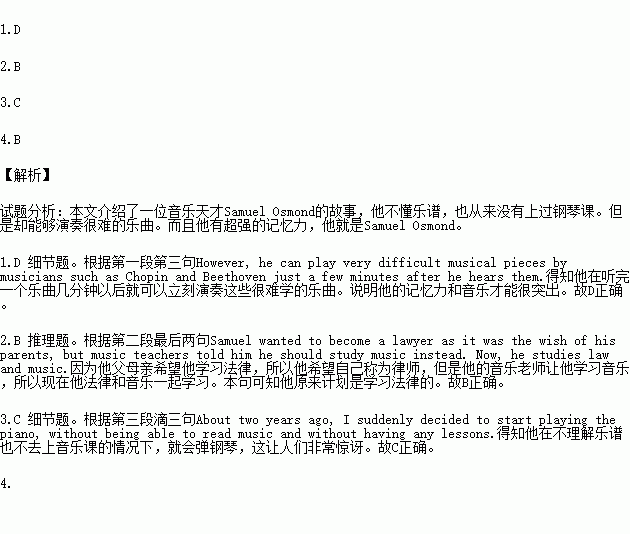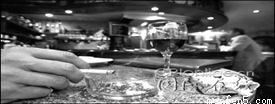题目内容
Samuel Osmond is a 19-year-old law student from Cornwall, England. He never studied the piano. However, he can play very difficult musical pieces by musicians such as Chopin and Beethoven just a few minutes after he hears them. He learns a piece of music by listening to it in parts. Then he thinks about the notes in his head. Two years ago, he played his first piece Moonlight Sonata(奏鸣曲)by Beethoven. He surprised everyone around him.
Amazed that he remembered this long and difficult piece of music and played it perfectly, his teachers say Samuel is unbelievable .They say his ability is very rare, but Samuel doesn’t even realize that what he can do is special. Samuel wanted to become a lawyer as it was the wish of his parents, but music teachers told him he should study music instead. Now, he studies law and music.
Samuel can’t understand why everyone is so surprised. “I grew up with music. My mother played the piano and my father played the guitar. About two years ago, I suddenly decided to start playing the piano, without being able to read music and without having any lessons. It comes easily to me ---I hear the notes and can bear them in mind---each and every note,” says Samuel.
Recently, Samuel performed a piece during a special event at his college. The piece had more than a thousand notes. The audience was impressed by his amazing performance. He is now learning a piece that is so difficult that many professional pianists can’t play it. Samuel says confidently,” It’s all about super memory---I guess I have that gift.”
However, Samuel’s ability to remember things doesn’t stop with music. His family says that even when he was a young boy, Samuel heard someone read a story, and then he could retell the story word for word.
Samuel is still only a teenager. He doesn’t know what he wants to do in the future. For now, he is just happy to play beautiful music and continue his studies.
1.What is special about Samuel Osmond?
A. He has a gift for writing music.
B. He can write down the note he hears.
C. He is a top student at the law school.
D. He can play the musical piece he hears.
2.What can we learn from Paragraph 2 ?
A. Samuel chose law against the wish of his parents.
B. Samuel planned to be a lawyer rather than a musician.
C. Samuel thinks of himself as a man of great musical ability.
D. Samuel studies law and music on the advice of his teachers.
3.Everyone around Samuel was surprised because he _________.
A. received a good early education in music
B. played the guitar and the piano perfectly
C. could play the piano without reading music
D. could play the guitar better than his father
4.Which of the following is the best title of the passage?
A. The Qualities of a Musician
B. The Story of a Musical Talent
C. The Importance of Early Education
D. The Relationship between Memory and Music.
 高中必刷题系列答案
高中必刷题系列答案


